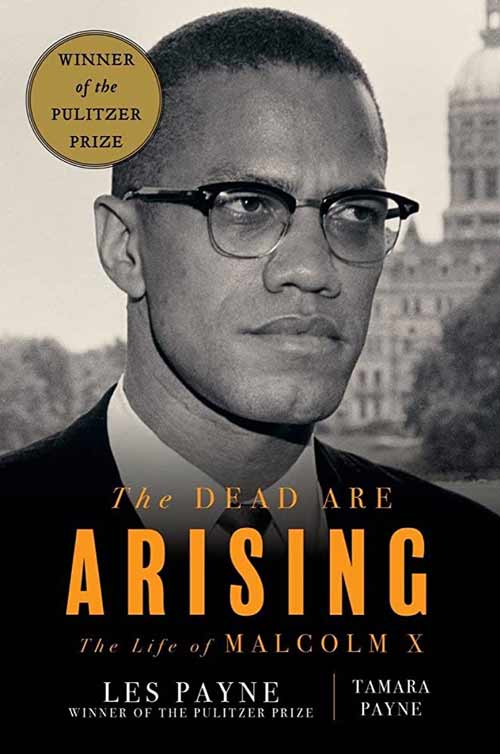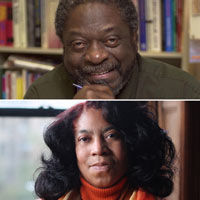Book Review
MalcolmX: Sowing the Seeds of Activism

Book Review
The Dead are Arising: The Life of Malcolm X
By Les Payne and Tamara Payne
537 pp. Liveright Publishing Corporation
By Dr. Brenda Green
In his essay, “The Black Arts Movement,” reprinted in SOS-Calling All Black People: A Black Arts Movement Reader, edited by John H. Bracey Jr., Sonia Sanchez, and James Smethurst (U. of Massachusetts Press, 2014), Amiri Baraka, poet, playwright, essayist, novelist, short story writer, and critic, reminds us that the assassination of Malcolm X, was the impetus for the Black Arts Movement. Malcolm had emerged as a leader who advocated for self-determination, self-respect, and self-defense. Black artists, musicians, writers, poets, and activists converged in Harlem rented a brownstone on W. 130th Street and began the work of uniting to create the Black Arts Repertory Theater School (BARTS). They set up classes in history, politics, and drama and brought Black art to the community through poetry readings, plays, music concerts,and “community preaching.” Malcolm’s leadership and vision in spearheading cultural, liberation, and political movements are meticulously researched and documented in The Dead Are Arising: The Life of Malcolm X (Liveright, 2020) by Les Payne and Tamara Payne. The biography won the 2020 National Book Award for Nonfiction and was the 2021 Pulitzer Prize Winner in Biography.

When we examine the state of race relations in this country, the rise of white supremacy, the censorship and banning of books, the attempts to suppress knowledge, and the overall attacks on democracy, it is important and timely to look at the life of those who led movements that were calls for acts of resistance. Malcolm X is an example of a man whose life’s work embodied activism and the struggle for human and civil rights.
In The Dead Are Arising: The Life of Malcolm X, the renowned Pulitzer Prize-winning late investigative journalist Les Payne with the assiduous research assistance of his daughter Tamara Payne, provides a 537-page comprehensive portrait of Malcolm X (el-Hajj Malik el-Shabazz) from the perspectives of his siblings, family, classmates, friends, cellmates, Nation of Islam (NOI) followers, FBI moles, and political figures around the world. Tamara took up the mantle and completed the biography after her father transitioned. What emerges from Payne’s nearly three decades of research and interviews is a narrative and biography that reveals how “the dead are arising.” The biography is both a story of Malcolm X, born May 19, 1925, and assassinated on February 21, 1965, and a story of the society that shaped Malcolm’s philosophy and world view. The reader comes away with a deeper understanding of the impact of the racial and political forces that affected Malcolm’s life: Garveyism, the death of his father, the institutionalization of his mother, the evolution of his spiritual beliefs, his days as a hustler (Detroit Red), and his realization of the power of rhetoric and his skill as a writer.
Payne’s investigative journalism is very much present in this biography. Unlike Malcolm X, who had privileged information when he wrote his autobiography, Payne, a natural storyteller, provides perspectives of Malcolm X’s life that are interwoven with history, politics and varied voices. There is much to digest and examine as the excerpted section below reveals.
In describing the impact of the Ku Klux Klan (KKK) on Malcolm’s family, Payne provides a riveting historical overview of the KKK circa 1915. The “white knights” were introduced to popular culture through the screening of D.W. Griffith’s movie, The Birth of a Nation which was based on a pro-Klan novel, The Clansman: An Historical Romance of the Ku Klux Klan by Thomas Dixon. President Woodrow Wilson was so enamored with the movie, that he had a screening of it in the White House. The KKK argued for ultra conservative views and were against Blacks, Jews, and Catholics. This history provides the backdrop for the irony when Malcolm X interacted with the Klan while serving as a negotiator after the national spokesman for the NOI requested that, in view of their belief that there would continue to be violence between the races, the KKK should assist the Muslims in acquiring land for Blacks somewhere in the Deep South.
The Dead Are Arising: The Life of Malcolm X is divided into four parts: Malcolm’s family life through 1939, his years in Detroit and prison, his initiation and rise in the NOI, and the split and span of years on the international stage and his return to the Mosque. Readers can pick up the biography at any point and get an in-depth rendering of Malcolm X’s life as well as the political stage and backdrop of race relations and politics in America. Les Payne and Tamara Payne have given us an unabridged narrative of a man who reminds us: “A race of people is like an individual man; until it uses its own talent, takes pride in its own history, expresses its own culture, affirms its own selfhood, it can never fulfill itself.”
Dr. Brenda M. Greene is Professor of English and Founder and Executive Director of the Center for Black Literature at Medgar Evers College, CUNY.

